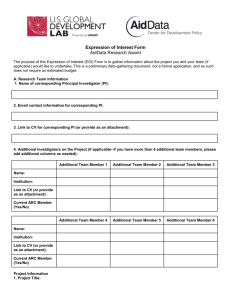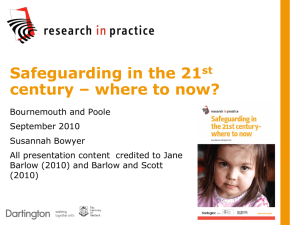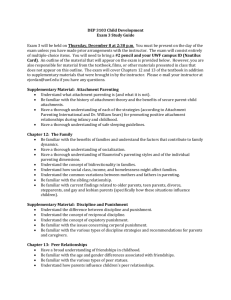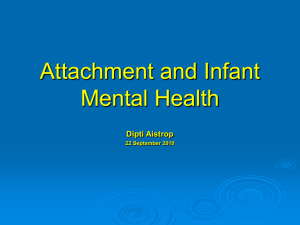Healthy Child Development - Ontario College of Family Physicians
advertisement
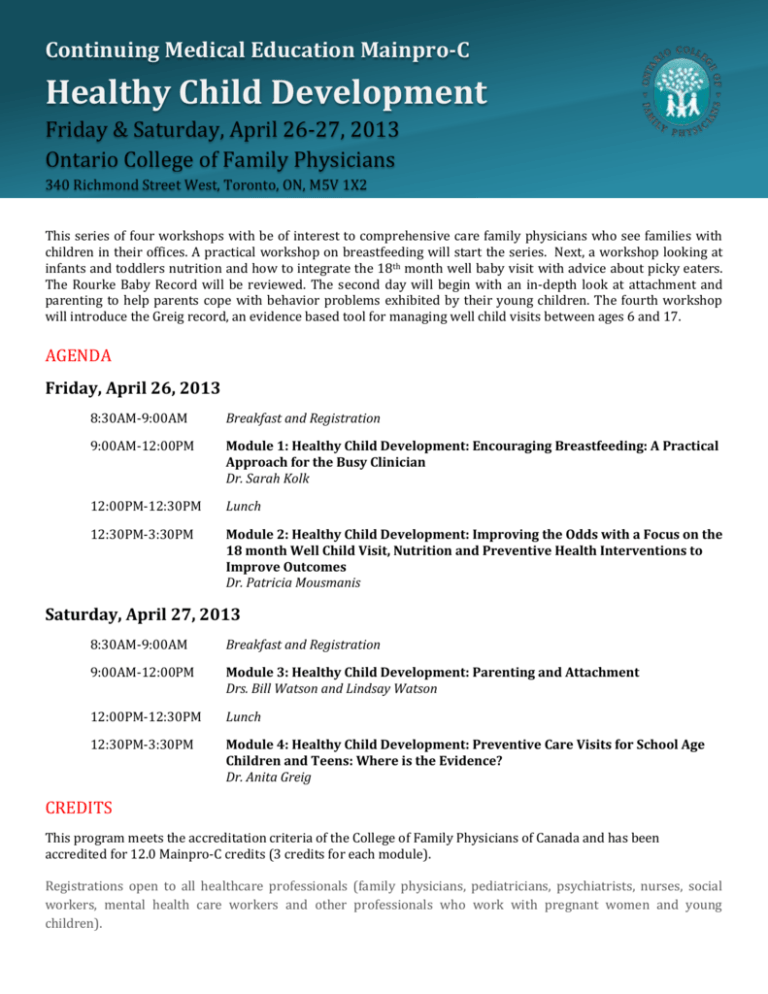
Continuing Medical Education Mainpro-C Healthy Child Development Friday & Saturday, April 26-27, 2013 Ontario College of Family Physicians 340 Richmond Street West, Toronto, ON, M5V 1X2 This series of four workshops with be of interest to comprehensive care family physicians who see families with children in their offices. A practical workshop on breastfeeding will start the series. Next, a workshop looking at infants and toddlers nutrition and how to integrate the 18th month well baby visit with advice about picky eaters. The Rourke Baby Record will be reviewed. The second day will begin with an in-depth look at attachment and parenting to help parents cope with behavior problems exhibited by their young children. The fourth workshop will introduce the Greig record, an evidence based tool for managing well child visits between ages 6 and 17. AGENDA Friday, April 26, 2013 8:30AM-9:00AM Breakfast and Registration 9:00AM-12:00PM Module 1: Healthy Child Development: Encouraging Breastfeeding: A Practical Approach for the Busy Clinician Dr. Sarah Kolk 12:00PM-12:30PM Lunch 12:30PM-3:30PM Module 2: Healthy Child Development: Improving the Odds with a Focus on the 18 month Well Child Visit, Nutrition and Preventive Health Interventions to Improve Outcomes Dr. Patricia Mousmanis Saturday, April 27, 2013 8:30AM-9:00AM Breakfast and Registration 9:00AM-12:00PM Module 3: Healthy Child Development: Parenting and Attachment Drs. Bill Watson and Lindsay Watson 12:00PM-12:30PM Lunch 12:30PM-3:30PM Module 4: Healthy Child Development: Preventive Care Visits for School Age Children and Teens: Where is the Evidence? Dr. Anita Greig CREDITS This program meets the accreditation criteria of the College of Family Physicians of Canada and has been accredited for 12.0 Mainpro-C credits (3 credits for each module). Registrations open to all healthcare professionals (family physicians, pediatricians, psychiatrists, nurses, social workers, mental health care workers and other professionals who work with pregnant women and young children). Module 1: Healthy Child Development: Encouraging Breastfeeding: A Practical Approach for the Busy Clinician Dr. Sarah Kolk Current evidence supports exclusive breastfeeding as the optimal method of early infant feeding, providing multiple health benefits and disease prevention for both infants and their mothers. Families receive much of their early care in the primary care family practice setting, therefore knowledge and support from their care team is essential to help promote, protect, and support successful and continued breastfeeding. This interactive, case-based workshop entitled "Encouraging Breastfeeding: a practical approach for the busy clinician", has been developed specifically to meet the needs of the primary care provider. It provides practical, useful information and strategies to help support patients to breastfeed, while recognizing that care must fit into the framework of a busy clinic. Learning Objectives: 1. Describe breastfeeding basics including latch, positioning, and assessing adequacy of intake 2. Discuss practical tips for approaching and managing common breastfeeding challenges, such as sore nipples, ankyloglossia, mastitis and low milk supply 3. Demonstrate anticipatory guidance to help families with normal infant feeding and growth patterns 4. Understand how to avoid common pitfalls in medical management that can undermine successful breastfeeding, particularly in relation to maternal illness, investigations and medications 5. Know where to quickly access evidence-based resources for further breastfeeding support and medical management Module 3: Healthy Child Development: Parenting and Attachment Healthy Child Development Friday & Saturday, April 26-27, 2013 Toronto, ON Module 2: Healthy Child Development: Improving the Odds Dr. Patricia Mousmanis The quality of early childhood experiences has an important influence on brain development and subsequent learning, behavior and health. The purpose of this program is to highlight developments in early neurodevelopment and to explore how these developments can be incorporated into primary care. This workshop will provide an overview of the field of Preventative Pediatric Health Care (0 - 6 years) through the well baby/child visit, using various evidence-based tools. In particular, the Rourke Baby Record, the M-CHAT, and the Nipissing District Developmental Screen will be utilized. Early identification of preconception and prenatal psychosocial issues, a Preconception checklist and the Antenatal Record will be reviewed. The Edinburgh Screen will be reviewed as a tool to identify post partum depression. Learning Objectives: 1. Identify risk factors which can impact brain development during the early years and recognize how family practice teams can optimize proactive health and developmental surveillance 2. Consider the role of preconception interventions to optimize developmental outcomes and review evidence regarding clinical strategies that can be included in antenatal, post partum and well child visits 3. Use case examples of well child visits as an example of how to do a full review of parent-child interactions, demonstrate practice tools for the primary care setting to assist in monitoring child developmental milestones (motor, language, social, cognitive) 4. Discuss the role of community resources to support families with children and how to improve developmental outcomes Module 4: Healthy Child Development: Preventive Care Visits for School Age Children and Teens: Where is the Evidence? Drs. Bill Watson and Linday Watson Dr. Anita Greig Healthy Child Development: Attachment This workshop will assist the practitioner to develop an understanding of Attachment Theory and Attachment Disorder in infants and toddlers. There will be information provided on various parenting behaviours and their impact on patterns of attachment. Suggestions will be provided for some primary care interventions that can improve attachment and referral resources within the community for families with attachment issues. The Healthy Child Development Improving the Odds and Facing the Challenges Manuals will be used. This workshop will explore evidence and tools for periodic health visits for school age children and teens. The Greig Health Record is an evidence-based health promotion guide for clinicians caring for children and adolescents aged six to 17 years. It is meant to provide a template for periodic health visits that is easy to use and is easily adaptable for electronic medical records. On the Greig Health Record, where possible, evidence-based information is displayed, and levels of evidence are indicated in boldface type for good evidence and italics for fair evidence. Included in the record are pages of guidelines and resources for reference Learning Objectives: 1. Develop an understanding of Attachment Theory and Attachment Disorders in infants and toddlers 2. Develop an understanding of parenting behaviours both positive and negative, and their impact on patterns of attachment 3. Describe some primary care interventions that can improve attachment/parenting and referral resources within the community for families with attachment/parenting issues Learning Objectives: 1. Review the evidence for periodic health visits in school age children and teens 2. Review the use of the Greig Health Record check-list 3. Explore resources available and included in the Greig Health Record 4. Review common presentations and issues in this age group patients initiate and maintain effective self-management skills Healthy Child Development Friday, April 26, 2013 Module 1: Healthy Child Development: Encouraging Breastfeeding: A Practical Approach for the Busy Clinician 9:00AM-12:00PM Module 2: Healthy Child Development: Improving the Odds 12:30PM-3:30PM Saturday, April 27, 2013 Module 3: Healthy Child Development: Parenting and Attachment 9:00AM-12:00PM Module 4: Healthy Child Development: Preventive Care Visits for School Age Children and Teens: Where is the Evidence? 12:30PM-3:30PM Registration Information _________________________________________________ ________________ Name (please include title) CFPC Member No. _____________________________________________________________________ Address _______________________________ _________ _____________ City Province Postal Code ______________________________________________________________________ Email Address _______________________________ _______________________________ Telephone Fax _______________________________ _______________________________ Do you have any dietary restrictions? How did you find out about this workshop? Payment Information (check one): Cheque enclosed Visa Mastercard _________________________________________________ ________________ Card Number Expiry (MM/YY) ________________________________________ Card Holder’s Signature Registration Fee (circle rate) Half Day One Day Two Days $200.00 (includes 13% HST.) $300.00 (includes 13% HST.) $550.00 (includes 13% HST.) Registration Deadline: April 17, 2013 (or earlier if space is no longer available) The OCFP reserves the right to cancel sessions due to unforeseen circumstances or insufficient advance registration. In the event of a cancellation made by the OCFP, a full refund will be given to the registrants. However, the OCFP cannot accept responsibility for out-of-pocket expenses due to cancellation of a session. Cancellations made by April 19th will be refunded, less a 25% administration fee. Please address completed Registration Form to: Ontario College of Family Physicians 340 Richmond Street West, Toronto, ON, M5V 1X2 Attention: Vincenza Ciampa Tel: 416-867-9646 ext. 32 Fax: 416-867-9990 vincenza@cfpc.ca A confirmation email will be sent within 2 business days of receiving your registration. If you do not receive confirmation, please contact us.

